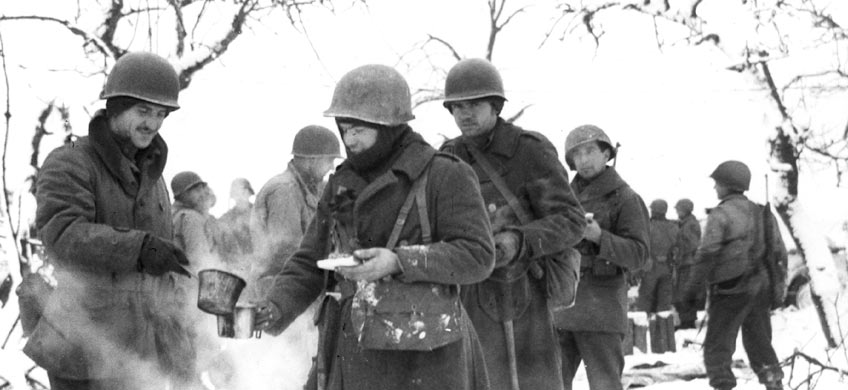
(page 2 of 4)
“One afternoon they took us to call upon Danielle Darrieux, the French actress living in retirement outside Paris. They took us one night to the home of Andre Berthomieu, a French movie director, and his wife, Leni Norro, a French actress. We spent three nights in country inns and a fourth in a lavish country home of a lady who embarrassed us with apologies. Germans had run off with all her sheets and best wines.” In this name-dropping piece, McCardell also informed Baltimore readers that near Rambouillet he had encountered the great American writer Ernest Hemingway, an old hand at conflict. McCardell was worried that other correspondents might beat him to Paris. Hemingway assured him that would not be the case, and he was right.
Watson was not to be outdone in high living. After arriving in Paris in the spectacular fashion mentioned above, he got himself a front-row seat at the historic Hotel Crillon to witness the surrender of the German headquarters command. He described this as “the main act of the day,” adding: “It was the end of the Master Race in the City of Light and it did not look at all like the visions Hitler had painted.” Old friends welcomed Watson and some of his fellow reporters to their home, gave them the use of a porcelain bathtub, and “seated us before the first white table cloth, shining silver, and glasses and china any of us had seen since quitting London.”
Despite these highjinks, there was a war on, and McCardell told of passing through the village of Monfort-LeMaury near Versailles. “The day before after a small American patrol had passed through, the villagers hung out all their flags. That night the Germans came back, shot the Maire and his wife, and burned his house. We understood then why French villagers were sometimes cautious.”
He also described evidence of combat even as the Paris celebrations began. French artillery was shelling German batteries in the Bois de Boulogne and the areas around the Auteuil race track. “In several instances crowds mobbed individual German prisoners and snipers. Police had to fight to protect the terrified Jerries.” Watson heard rumors shots were fired at General Charles de Gaulle when he attended services at the Cathedral of Notre Dame. He reported that two French priests present at the ceremony had confirmed the stories. When visiting Notre Dame himself, he saw “chairs were still lying around overturned in the two side aisles”—signs the de Gaulle party had moved quickly outside the line of fire. Those firing on de Gaulle were described as Germans, or Communists or Vichyites—perhaps all three—as the general took control of the city.
Both Sun reporters marveled at the exuberance of Parisians when columns of American troops finally entered their city. Their welcome was “hysterical,” wrote McCardell, “even while the streets still echoed and reechoed with the last hopeless resistance. I felt like I had been moving in a dream. Crowds of men, women, and children were screaming ‘Bravo,’ throwing flowers at columns of Allied tanks, half-tracks and jeeps. Tears were running down many a Parisian’s cheek. Tears ran down my own once or twice.”
Watson made a similar observation as he told of racing to keep up with the American Fourth Infantry Division, which had been given the honor of leading the official U.S. entry. “The citizenry tossed flowers and swarmed over every truck or jeep that stopped, deluging non-reluctant soldiers with enraptured kisses.” He told of meeting a Frenchman, a fellow veteran of World War I, who had lost a son in the current conflict. “?This day is the first day of joy I have had since my boy’s death,” he told Watson. French crowds taunted and threatened terrified German soldiers. They shouted “Assassins . . . Pigs . . . Thieves” and “a few other expletives that would startle a Pratt Street longshoreman.”
Paris had been a scene of sporadic street fighting for days as a German withdrawal hung in the balance and the Resistance forces were divided between Communists and Gaullists. All were at least united in hunting down Vichy regime collaborationists, a quest that resulted in gunfire at the Chamber of Deputies, a last retreat for Vichy police units. As for girls who had been friendly with German occupiers, their reward was a shaved head. Watson told of one girl who was left with “a small double clump of short hair in imitation of Hitler’s moustache.”
Watson wrote that “there is no doubt that the city’s enormous resources as a rail and road center will prove valuable for the coming phases of the campaign.” But he also told of growing supply difficulties as Allied armies rushed eastward, beyond Paris. Only later was it learned the great French capital had escaped the fate of devastated Warsaw when the German commander decided to prove himself a European—repeat, a European—daring to defy Hitler.
The next day The Sun carried reports by Watson and McCardell warning that the Paris situation remained dangerous and uncertain. The French Resistance and German authorities had agreed on a three-day armistice during which German troops would leave the city. “Time will tell whether the Paris committee was wise in granting the armistice at all,” Watson commented. McCardell, for his part, reported rumors from Paris alleging outright combat between Nazi troops. But in the end, Paris remained intact—one of the great achievements of Western civilization. It was a heady moment in the war, with Price Day reporting from Marseille that Germans were disorganized and offering only token resistance to the Allied offensive in southern France. “The present advance is in fact hardly a military campaign at all in many places. It is an expedition through friendly country.” He warned, however, that the Germans still held one-third of Marseille and had a battery of two hundred guns in the port area.
